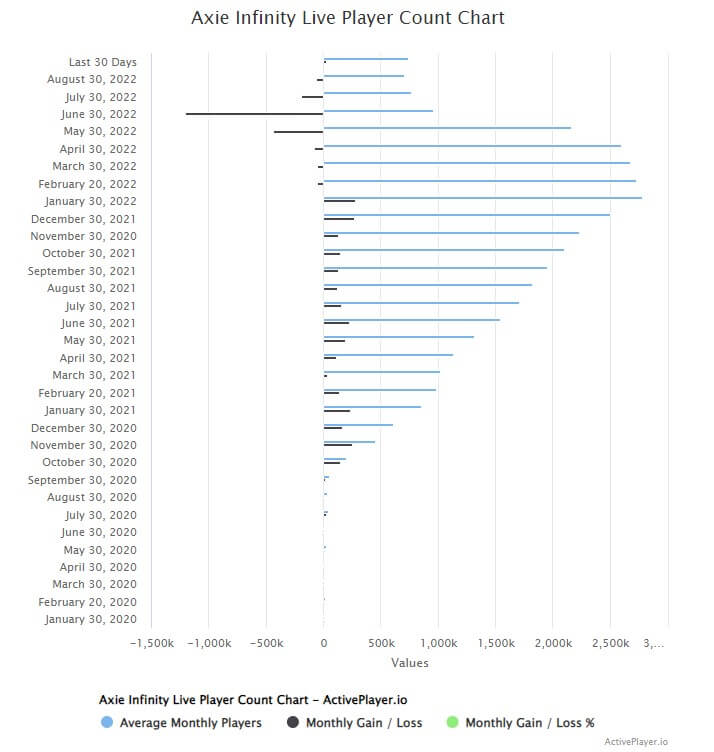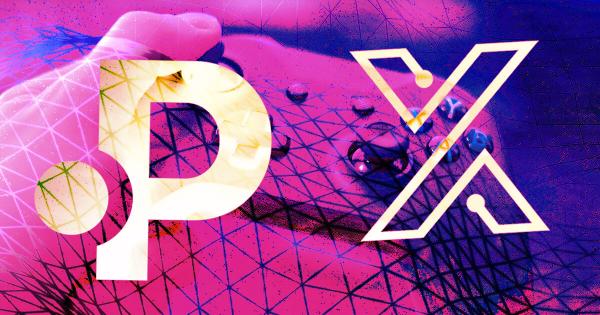When you think of web3 or blockchain gaming, you most likely think of the term play-to-earn, a craze that swept the industry in 2021 with games such as Axie Infinity soaring in popularity, web3 gaming guilds such as YGG exploded, and play-to-earn was all the rage.
In 2022 the phenomena continued with other types of play-to-earn games, such as STEPN arriving on the scene, allowing users to earn crypto by gamifying exercises. Users all over the internet were clambering for ‘scholarships’ from web3 gaming guilds to enable them to make money through online games.
Yet, the inability to retain value in both token prices and in-game NFTs has caused an exodus of players from the top play-to-earn games. The below chart shows the rise and fall of Axie Infinity’s daily player base, which peaked at the start of 2022.

The New Bloc
However, two well-established players in the crypto space are looking to shake things up regarding web3 gaming. Polkastarter and Swissborg have formed two gaming entities, Polkastarter Gaming and Xborg, respectively, that are turning the entire blockchain gaming space on its head.
CryptoSlate recently sat down with both Omar Ghanem, Head of Gaming at Polkastarter, and Louis Regis, Founder of Xborg, and the synergy between the two brands was clear. Unlike in most other areas of blockchain gaming, the term “earn” was not the focus of the conversation from either project.
Polkastarter Gaming told CryptoSlate that its ecosystem focuses on games with high-quality gameplay rather than play-to-earn. In fact, Daniel Stockhaus, co-founder of Polkastarter, famously banned the term from being used within the company in favor of play-and-earn.
In our talk with Xborg, Regis echoed this sentiment as he is focused on creating a web3 eSports platform that rivals, and even beats, those found in web 2.0. Further, Regis went on to state that
“when I’m gaming I just want to have fun, the last thing I want to hear is ‘how can I earn’?”
The perception of blockchain gaming from outside the crypto world is of low-quality gameplay and basic game mechanics tied to earning crypto tokens. Gaming is interactive escapism from the real world; therefore, connecting all gameplay to a monetary asset defeats the object for many gamers.
However, after spending time with Regis and Ghanem, it is clear that these concerns need not be a part of the next stage in the evolution of blockchain gaming. Games within the Xborg and Polkastarter ecosystems use blockchain technology to give players control and ownership over their in-game assets.
Games such as Big Time are even going as far as to create an entirely played-owned economy, with its token launch being void of any pre-sale, team lockup, or VC vesting schedules. All tokens will be earned in-game with governance therefore split amongst the most dedicated and passionate players.
Xborg
Xborg follows a similar model, with its governance tied directly to Genesis NFT ownership. Regis informed CryptoSlate that even he, as the founder, will have to buy his own NFT to participate in governance once the platform is fully live.
NFT holders will decide the direction of Xborg as, eventually, “the players will govern the ecosystem.” Regis expressed that Xborg targets “web2 players and wants to give them the best gaming experience possible.”
Your gaming identity is stored on the blockchain as a Soulbound Token with data pulled from web2 sources for games such as League of Legends, Apex Legends, and other AAA titles. Regis has the vision of Xborg acting as a scouting resource for eSports teams to find the best unsigned talent in gaming by harnessing the power of blockchain data.
Polkastarter Gaming
Polkastater Gaming, on the other hand, is focused on delivering “a new source of relevant games and apps” within the web3 gaming world. Further, Polkastarter Gaming Guild has received “over 5,000+ scholarship program applications since its launch in December 2021.”
The Polkastarter Gaming website proclaims that “gaming has never been about microtransactions or tokenomics – it’s about unforgettable moments & endless fun.” Speaking to the head of gaming in Ghanem, it is clear that this mission is front and center of everything Polkastarter gaming does.
Blockchain gaming can give power back to the players allowing them to shape the games they play based on their needs as opposed to those of a developer or publisher.
Ghanem had nothing but great things to say about Xborg when CryptoSlate spoke to him, and Regis confirmed that “we embody the same values.” However, it goes behind this as he continued, “we text each other every day and we’ve become very good friends.”
Ultra
Both Polkastarter and Xborg platforms have announced some vast partnerships, with Xborg linking up with Polygon for its NFT mint on Sept. 14, Polkastarter Gaming launching some of the most incredible web3 games around, and both Polkastarter and Xborg teaming up with Ultra for content distribution and the tournament ecosystem.
Ultra is a web3 gaming platform akin to Steam or Epic Games in web 2.0. It is a launcher, hub, and distribution platform for blockchain-based games. The website describes it as a “new era for gamers,” whereby.
“Ultra is the first entertainment platform that brings games, digital assets, tournaments, and live steams to one place, all easily accessible through a single login.”
Regarding the collaboration with Ultra, Ghanem said,
“Our partnership with Ultra is yet another step towards the web3 gaming evolution. From launching new games on Ultra’s all-encompassing entertainment platform to advancing the gaming experience through NFT launches and tournaments, this is a collaboration we can’t wait to launch and share with you.”
Many projects are attempting to marry blockchain with gaming. Still, the gaming-first approach of the play-and-earn bloc of Polkastarter, Xborg, and Ultra may well be perfectly positioned to live up to the hype and change the face of gaming forever.
The post The Play to Earn craze may be over with Polkastarter, Xborg’s entry into the gaming arena appeared first on CryptoSlate.








